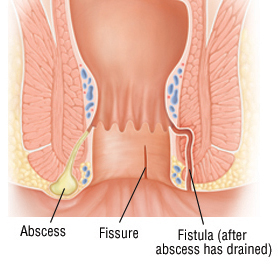
What is Fissure?
A small tear in the lining of anus is called fissure. An anal fissure may occur when you pass hard or large stools during a bowel movement. Anal fissures typically cause pain and bleeding with bowel movements. You also may experience spasms in the ring of muscle at the end of your anus (anal sphincter).
Anal fissures are very common in young infants but can affect people of any age.
Acute anal fissures — the ones that don’t last longer than 6 weeks — are common and usually heal on their own with self-care. Chronic anal fissures — those that last longer than 6 weeks — may need medicine and further management to help them heal.
Symptoms
Signs and symptoms of an anal fissure include:
- Moderate to severe Pain around anus, during motions. Pain typically described by patient is cutting, shooting, tearing type of pain that can last for several hours after passing motions.
- Severe anal spasm. due to severe pain there can be severe spasm of anus preventing patient to defecate.
- Bright red blood along with the stool after motions. Frank blood in motions is due to the crack in anal mucus which fails to heal
- Itching, swelling and discharge are common symptoms of chronic fissure
- A visible crack in the skin around the anus
- A small lump or skin tag on the skin near the anal fissure
Causes
Most common cause of the fissure-in-ano is constipation. Chronic constipation due to any reason (such as due to lifestyle, habitual, drug-induced, due to pregnancy, etc.)
- Common causes of anal fissure include:
- Passing large or hard stools
- Constipation and straining during bowel movements
- Chronic diarrhea
- Anal intercourse
- Childbirth
Less common causes of anal fissures include:
- Crohn’s disease or another inflammatory bowel disease
- Anal cancer
- HIV
- Tuberculosis
- Syphilis
Risk factors
Factors that may increase your risk of developing an anal fissure include:
Long continued Constipation: Straining during bowel movements and passing hard stools increase the risk of tearing.
Childbirth: Anal fissures are more common in women after they give birth.
Crohn’s disease: This inflammatory bowel disease causes chronic inflammation of the intestinal tract, which may make the lining of the anal canal more vulnerable to tearing.
Age: Anal fissures can occur at any age, but are more common in infants and middle-aged adults.
Complications
Complications of anal fissure can include:
Failure to heal: An anal fissure that fails to heal within eight weeks is considered chronic and may need further treatment.
Recurrence: Once you’ve experienced an anal fissure, you are prone to having another one.
A tear that extends to surrounding muscles: An anal fissure may extend into the ring of muscle that holds your anus closed (internal anal sphincter), making it more difficult for your anal fissure to heal. An unhealed fissure can trigger a cycle of discomfort that may require medications to reduce the pain and to repair or remove the fissure.
How homeopathy helps ?
- Homeopathy is strongly recommended for anal fissures
- As it accesses the underlying causes
- Helps in healing the fissure quickly and permanently
- Helps to soften the stool to prevent constipation
- Helps to reduces symptoms
- Prevents recurrence of symptoms
All Diseases
Opening Hours
- Monday To Saturday 11:00 AM - 1:00 PM
6:00 PM - 8:00 PM - Sunday Closed